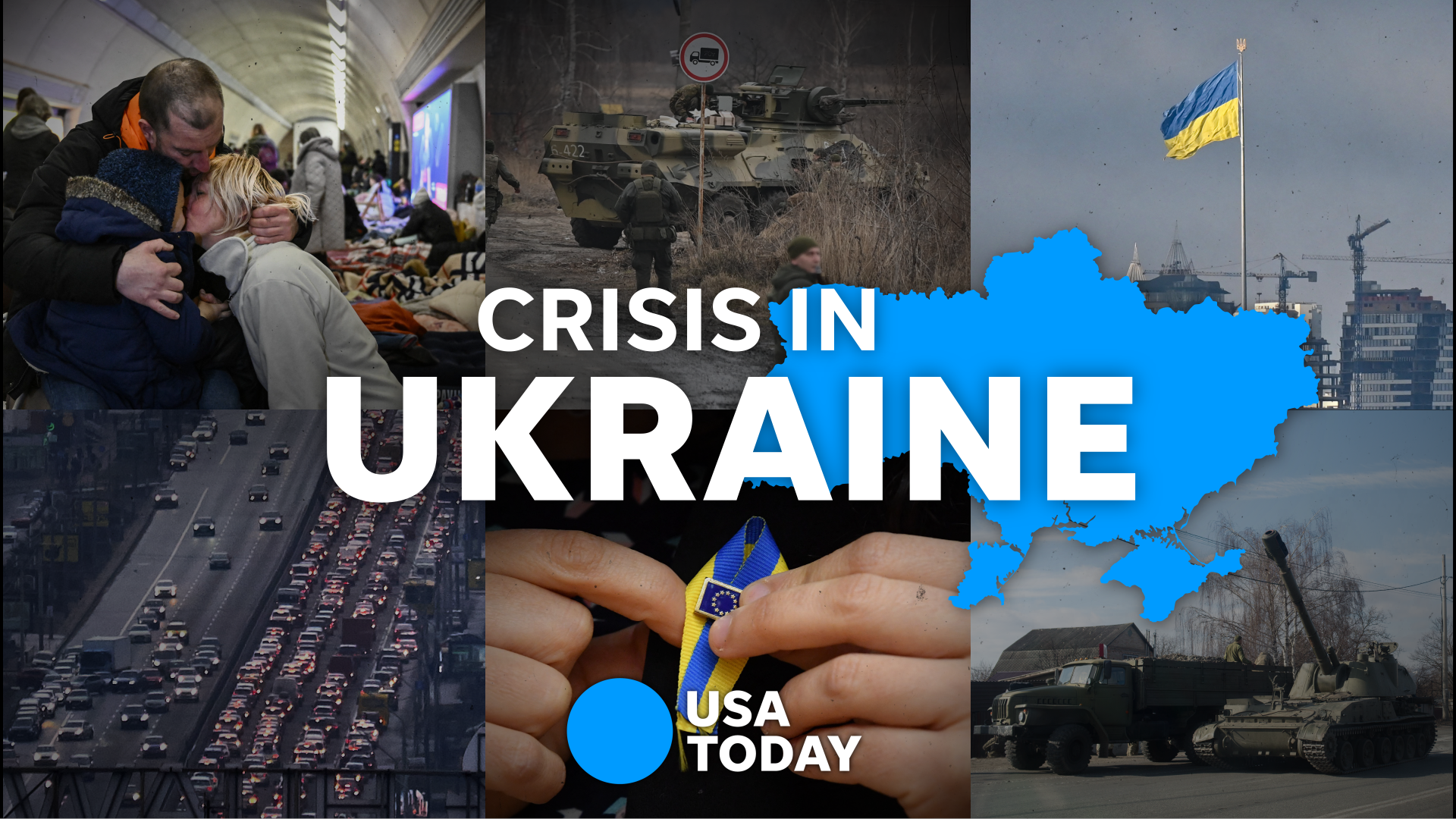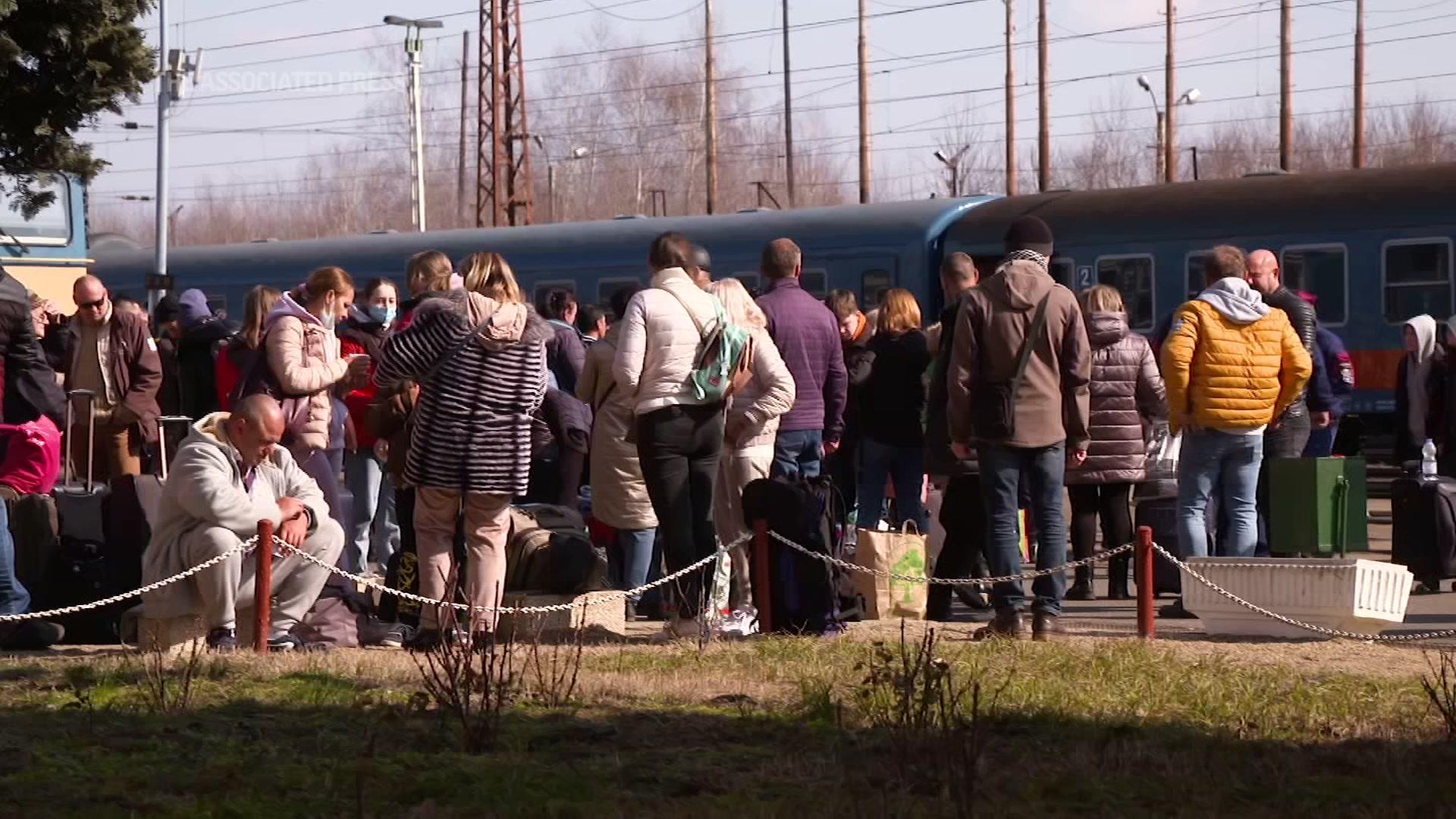
Crisis in Ukraine: The global implications of Russia’s invasion
As Russia’s invasion of Ukraine rages on and the humanitarian toll mounts, USA TODAY reporters in the region and in Washington chart the ripple effects of this unprecedented conflict. Zulekha Nathoo hosts ‘Crisis in Ukraine.’
Staff video, USA TODAY
Russia’s military said it would cease fire and open humanitarian corridors in several Ukrainian cities Monday – yet continued to pound residential areas of battered cities with rocket attacks.
A third round of talks were planned for Monday after two previous negotiations proved fruitless.
The Russian Defense Ministry had said a cease-fire would allow safe passage for evacuees from the capital of Kyiv, the southern port city of Mariupol, and the cities of Kharkiv and Sumy. Some of the evacuation routes, however, would funnel civilians toward Russia or its ally Belarus, a plan that Ukrainian Deputy Prime Minister Irina Vereshchuk called “unacceptable.”
“Providing evacuation routes into the arms of the country that is currently destroying yours is nonsense,” said U.K. Europe Minister James Cleverly.
Ukraine Defense Secretary Aleksey Danilov said Russia “violates the agreements reached – blocks the opening of “green corridors”, does not allow humanitarian supplies, but at the same time tries to create a false picture of a ‘joyful meeting’ of the occupiers by local residents.”
Latest developments:
►The International Atomic Energy Agency Director General Rafael Mariano Grossi said he is “extremely concerned” that Russian forces are beginning to assert authority over operation of Zaporizhzhya nuclear plant, Ukraine’s largest, that they seized last week.
►The death toll of the conflict has been difficult to measure. The U.N. human rights office said at least 364 civilians have been confirmed killed since the Feb. 24 invasion, but the true number is probably much higher.
►Netflix said Sunday it’s suspending service in Russia, joining the growing list of companies shunning the country. Earlier in the day, TikTok and American Express said they would suspend operations in the country, which followed announcements by Visa and Mastercard Saturday. TikTok also said it will start labeling content from accounts used by state-controlled media.
Quick links:
GET UKRAINE UPDATES: We’ll email you the latest news once a day
VISUALS: Mapping and tracking Russia’s invasion of Ukraine
The United Nations’ refugee agency says the number of people who have fled the war in Ukraine has increased to more than 1.7 million.
The U.N. High Commissioner for Refugees on Monday put the number of people who have arrived in other countries since the Russian invasion started on Feb. 24 at some 1.735 million. That’s up from more than 1.53 million on Sunday.
Nearly three-fifths of the total — nearly 1.03 million — arrived in Poland, according to the agency. Over 180,000 went to Hungary and 128,000 to Slovakia.
In Montpellier, France, EU foreign affairs policy chief Josep Borrell called on mobilizing “all the resources” of the bloc of 27 nations to help countries welcoming refugees from Ukraine, including neighboring Poland and Romania. Borrell spoke ahead of a meeting of development ministers of the EU.
— Associated Press
Russia has snubbed a hearing at the United Nations’ top court into a legal bid by Kyiv to halt Moscow’s devastating invasion of Ukraine. A row of seats reserved for Russian lawyers at the International Court of Justice was empty Monday morning as the hearing opened.
The court’s president, American judge Joan E. Donoghue, said Russia’s ambassador to the Netherlands informed judges that “his government did not intend to participate in the oral proceedings.” The hearing went ahead without the Russian delegation.
The International Court of Justice is opening two days of hearings at its headquarters, the Peace Palace, into Ukraine’s request for its judges to order Russia to halt its invasion. Ukraine is scheduled to present its arguments Monday morning and Russia has the opportunity to respond on Tuesday.
A decision is expected on the request within days, though that does not mean Russia would abide by any order the court might issue.
U.S. Secretary of State Antony Blinken has begun a lightning visit to the three Baltic states that are increasingly on edge as they watch Russia press ahead with its invasion of Ukraine.
The former Soviet republics of Latvia, Lithuania and Estonia are all members of NATO and Blinken aims to reassure them of the alliance’s protection in the event Russia chooses to expand its military operations to other neighboring countries.
Memories of Soviet occupation are still fresh in the Baltics and since the invasion of Ukraine last month, NATO has moved quickly to boost its troop presence in its eastern flank allies while the U.S. has pledged additional support.
Blinken’s Baltic tour opened Monday in the Lithuanian capital of Vilnius, where support for Ukraine’s resistance to the invasion government is palpable with signs of solidarity with Ukrainians in many businesses and on public buildings and buses.
While most of the world is shunning President Vladimir Putin over Russia’s invasion of Ukraine, one of the few leaders keeping an open line of communication is French President Emmanuel Macron.
Macron’s diplomatic efforts to prevent the war failed, but he’s not giving up: the two men have spoken four times since Russian forces attacked Ukraine on Feb. 24, and 11 times over the past month.
The French leader, whose country holds the European Union’s rotating presidency, is now one of the few outsiders with a view into Putin’s mindset at the time of the largest military invasion in Europe since World War II. Israeli Prime Minister Naftali Bennett is also becoming a mediator, meeting Putin on a surprise visit to Moscow on Saturday and speaking with him again by phone on Sunday.
Macron’s relentless push for dialogue reflects France’s post-World War II tradition of carving out its own geopolitical path and its refusal to blindly follow the United States. Secretary of State Antony Blinken will go to Paris Tuesday to hear from Macron directly about his latest conversations with Putin.

Young Ukrainian musicians expected in Hungary
Dozens of young orchestral musicians, instruments in hand, found safety in Hungary on Sunday after fleeing war in Ukraine. (March 7)
AP
New Zealand’s government said Monday it plans to rush through a new law that will allow it to impose economic sanctions against Russia over its invasion of Ukraine.
Unlike many countries that have already introduced sanctions, New Zealand’s existing laws don’t allow it to apply meaningful measures unless they’re part of a broader United Nations effort. Because Russia has U.N. Security Council veto power, that has left New Zealand hamstrung.
Prime Minister Jacinda Ardern said the new legislation would allow it to target people, companies and assets connected to those in Russia associated with the invasion, including oligarchs. It would allow New Zealand to freeze assets and stop superyachts or planes from arriving.
The bill will be specific only to the Ukraine invasion but could allow New Zealand to impose sanctions on countries seen to be helping Russia, such as Belarus.
Australia’s prime minister has described Russia and China’s closer relationship as opportunistic rather than strategic.
Prime Minister Scott Morrison on Monday labeled the alliance an “Arc of Autocracy” and said Russia and China would prefer a new world order to the one that has been in place since World War II.
Morrison has criticized Beijing’s failure to condemn Russia’s invasion of Ukraine and China’s expansion of trade in Russian wheat while other countries are imposing sanctions.
Australia last week promised Ukraine $50 million in missiles, ammunition and other military hardware to fight Russian invaders.
Morrison said on Monday: “Our missiles are on the ground now.”
The price of oil surpassed $10 a barrel as shares fell sharply Monday.
Brent crude oil surged more than 12% during the day in Asia, while benchmark U.S. crude gained about $10 at more than $125 a barrel.
The effects of rising gas prices have been mounting across the world and in the U.S., where the national average price for gas has topped $4 a gallon for the first time in over a decade. U.S. futures also fell, with the contract for the benchmark S&P 500 down 1.6% and that for the Dow industrials falling 1.3%.
Speaker of the House Nancy Pelosi said Sunday evening that Congress is exploring “strong legislation” that would ban the import of Russian oil and energy products into the U.S. If passed, the legislation would almost certainly affect oil and gas prices worldwide.
Russia doesn’t export much oil to the United States, but it’s just enough that the threat of banning its crude from American shores is driving gas prices and leaving some regions – notably the West Coast – facing the prospect of less crude to process at refineries and making costs even higher at the pump, experts say.
— Celina Tebor and Craig Harris
OIL FROM RUSSIA: How much oil does the US buy from Russia? Not much, but gas prices are rising amid Ukraine invasion
GAS PRICES ARE RISING: What can Biden do to lower costs at the pump amid Russia’s invasion of Ukraine?
The Biden administration has requested $10 billion in humanitarian, military, and economic support for Ukraine, Speaker of the House Nancy Pelosi announced in a news release Sunday evening.
Biden has strongly affirmed that he will not send U.S. troops to fight in Ukraine, but the funds, which will be part of the federal government’s omnibus funding legislation, will likely provide military equipment and support U.S. allies who are supplying airplanes to Ukraine, Pelosi’s release said.
She also said the U.S. House of Representatives is exploring “strong legislation” that would ban the import of Russian oil and energy products into the U.S., repeal normal trade relations with Russia and Belarus, and take the first step in denying Russia access to the World Trade Organization.
— Celina Tebor
Contributing: The Associated Press
More Ukraine-Russia news
from WordPress https://ift.tt/lOYHPh8
via IFTTT

No comments:
Post a Comment